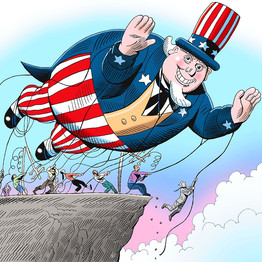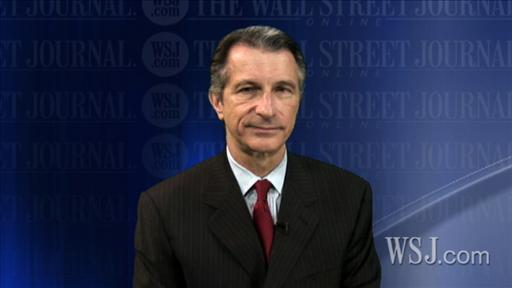It's the Spending, Stupid
A chronic voter 'concern' has now exploded into a broad public movement.
By Daniel Henninger
WSJ.com
At a backyard town-hall meeting in Fairfax, Va., Monday, President Obama explained why Christine O'Donnell was going to beat Mike Castle in the GOP's Delaware Senate primary:
"They saw the Recovery Act," he said. "They saw TARP. They saw the auto bailout. And they look at these and think, 'God, all these huge numbers adding up.' So they're right to be concerned about that."
Of course Mr. Obama was speaking generally about the public mood. Let's call it his "generic" explanation for the current voter impulse to wipe out GOP incumbents now and Democrats in November.
Here's your bumper sticker for the 2010 elections: It's the Spending, Stupid.
And the president didn't mention the two $3 trillion-plus budgets passed on his watch or the trillion-dollar health-care entitlement. They, the voters, are not "concerned" about Uncle Sam's spending floating toward the moon. They are enraged, furious, crazed and desperate.
Pennsylvania's shrewd Democratic Gov. Ed Rendell, scripting the new conventional wisdom, says the tea party movement supporting Christine O'Donnell, Sharron Angle in Nevada and Joe Miller in Alaska proves the GOP is in the grip of crazies. With luck, none of his audience will wake up from this delusion before November.
Back in April, the New York Times/CBS did a poll of tea party supporters. When asked, "What should be the goal of the Tea Party movement," 45% said, "Reduce federal government." That is, cut spending. Everything else was in single digits.
I'm convinced that beneath all the economic turbulence in the land is anxiety that's been building for years as public spending has continued to grow. What was a chronic "concern" has exploded this year into a broad public movement—in Washington, California, New York, New Jersey and indeed across Europe. This isn't "concern," Mr. President. It's a crisis.
Look at the astonishing numbers in the Rasmussen poll released last week. Nearly seven in 10 respondents (68%) want a smaller government, lower taxes and fewer services. The party breakdown: GOP, 88%; Democrats, 44%; and Other, 74%. In short, the independent voters who decide national elections have moved into the anti-spending column. I don't think they'll leave any time soon.
In a note on last week's poll, Rasmussen points out that the only time it recorded a higher shrink-the-government number, at 70%, was in August 2006. That was just ahead of the famous off-year election in which Republican voters withheld support for their party's free-spending members in Congress.
The Obama White House holds that the spending concerns Mr. Obama cited Monday—the stimulus, TARP, the auto bailout—were necessary. Whatever any individual merit in this stuff, it hit most voters at a moment when nearly any big government outlays were going to be written off as "more spending." When Mr. Obama said the health bill was "paid for," naturally polls showed that no one believed him. Why should they?
This loss of faith predates the Obama presidency.
I called Scott Rasmussen this week to discuss the roots of the anti-spending mood, and he suggested that the American electorate's desire for pushback against the growth in federal spending dates at least to 1992 and Ross Perot's third-party presidential bid, which drew 18.9% of the popular vote. Indeed, Mr. Rasmussen argues, you can find evidence of the turn in Jimmy Carter's "efficiency in government" efforts.
Until Barack Obama, the only Democrats who had a chance of winning the presidency were Southern governors with a reputation for fiscal moderation. But after Bill Clinton won the White House in 1992, he immediately tried to pass the mammoth health-care entitlement known as HillaryCare. After 17 acrimonious months, it died in August 1994. That November, voters gave control of the House to the GOP for the first time in 40 years. It was about more than Newt Gingrich's charm.
So this year the Democrats, who control Congress because of voter disgust with the Republicans in 2006, passed a health-care entitlement. And this year voters will transfer power back to the Republicans.
The most important and startling number in American politics today is Congress's approval rating: 23%. This is a no-confidence vote. The second branch of government is losing the country. Surely it's about the spending. What else? That Congress hasn't spent enough?
If voters give control of the House to the GOP, the party desperately needs to establish credibility on spending. Absent that, little else is possible. Independent voters now know that the national Democratic Party, hopelessly joined to the public-sector unions, will never stabilize public outlays.
In a sense, the GOP's impending victory is meaningless, a win by default. If the Republican rookies entering Congress next year don't do something identifiably real to stop the federal-spending balloon, voters two years from now will start throwing the GOP under the bus. Absent action, the political rage and cynicism on offer in 2012 could make this year's tea parties look like, well, a tea party.
Write to henninger@wsj.com

